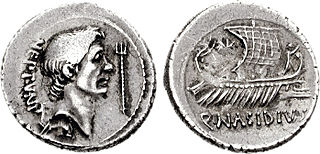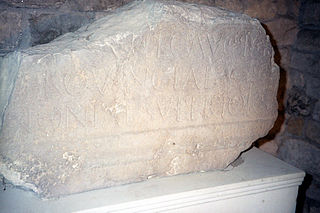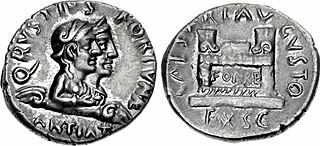The gens Cluvia was a plebeian family at Ancient Rome, known from the later Republic, and early imperial times. The first member of the gens to achieve prominence was Gaius Cluvius Saxula, praetor in 175 and 173 BC.
The gens Tineia was a Roman family of imperial times. Members of this gens first appear in history in the time of Hadrian; the first to obtain the consulship was Quintus Tineius Rufus in AD 127.

The gens Nasidia was an obscure plebeian family at Rome. The gens is best known from Quintus Nasidius, one of the admirals of Gnaeus Pompeius Magnus during the Civil War. Although none of the Nasidii are known to have held any of the higher offices of the Roman state, a number are known from inscriptions. A coin of this gens depicts the head of Pompeius and a trident on the obverse, and on the reverse a ship, with the inscription Q. Nasidius.
The gens Numonia, occasionally written Nummonia, was a minor plebeian family at Rome. Members of this gens are first mentioned in the early years of the Empire. Few if any of the Numonii held any Roman magistracies.
The gens Occia was a minor plebeian family at Rome. Members of this gens are first mentioned under Tiberius, but must have been at Rome for much longer; for Tacitus speaks of Occia, a Vestal Virgin who died in AD 19, after serving faithfully for fifty-seven years. A few of the Occii pursued political careers in this period, but most are known only from inscriptions.
The gens Orbia was a minor plebeian family at Rome. No members of this gens are known to have held any magistracies, but many of them are known from inscriptions. The most illustrious of the family may have been the jurist Publius Orbius, a contemporary of Cicero.
The gens Ovidia was a plebeian family of ancient Rome. Only a few members of this gens are mentioned in history, of whom the most famous is unquestionably the poet Publius Ovidius Naso, but others are known from inscriptions.
The gens Percennia was a plebeian family at ancient Rome. Members of this gens first appear in history in the early years of the Empire, and several of them were of senatorial rank, although it is not known what magistracies they held. The most famous of the family may have been the Percennius who led a mutiny of the Pannonian legions in AD 14, which Drusus was obliged to put down.

The gens Persia was a minor plebeian family at Rome. Members of this gens are first mentioned during the Second Punic War, but they only occasionally occur in history. The most illustrious of the family was the satirist Aulus Persius Flaccus, who lived during the middle part of the first century.

Marcus Iallius or Jallius Bassus was a Roman senator, general, and literary figure who held several offices in the imperial service during the mid-second century AD. He was suffect consul around the year 159. Bassus is known primarily from inscriptions. His full name was Marcus Iallius Bassus Fabius Valerianus.
The gens Pontilia was an obscure plebeian family at ancient Rome. Hardly any members of this gens appear in history, but a number of them are mentioned in inscriptions.
The gens Praeconia, occasionally written Preconia, was an obscure plebeian family at ancient Rome. No members of this gens are mentioned in history, but a few are known from inscriptions.
The gens Romania was an obscure plebeian family at ancient Rome. No members of this gens appear in history, but many are known from inscriptions.
The gens Rufinia was an obscure plebeian family at ancient Rome. Few members of this gens are mentioned in history, although the derivative surname Rufinianus appears in several sources. A number of Rufinii are known from inscriptions.

The gens Rustia was a minor plebeian family at ancient Rome. Members of this gens are first mentioned toward the end of the Republic, and a few of them achieved prominence in imperial times, with Titus Rustius Nummius Gallus attaining the consulship under Tiberius in AD 34.
The gens Sabucia was a minor plebeian family at ancient Rome. Members of this gens are first mentioned in imperial times. The most illustrious of the family was Gaius Sabucius Major Caecilianus, who obtained the consulship in AD 186. Other Sabucii are known from inscriptions.
The gens Salvidiena was a plebeian family at ancient Rome. Members of this gens are first mentioned toward the end of the Republic, and from then to the end of the second century they regularly filled the highest offices of the Roman state.
The gens Seia was a minor plebeian family of equestrian rank at ancient Rome. Members of this gens are first mentioned in the time of Cicero, and a few of them held various magistracies under the late Republic and into imperial times.
The gens Balonia was an obscure plebeian family at ancient Rome. No members of this gens are mentioned in ancient writers, but a number are known from inscriptions.
The gens Javolena, occasionally found as Javolenia, was a minor plebeian family at ancient Rome. Few members of this gens appear in history, but two of them attained the consulship, one under Domitian, and the other in the time of Antoninus Pius.




